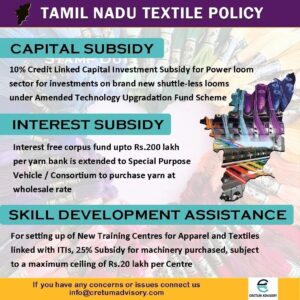Tamil Nadu Textile Policy
The textile capital of India, Tamil Nadu, accounts for almost 1/3 of the nation textile production. To further assist this expansion, the Tamil Nadu government implemented the Tamil Nadu Textile Policy, which seeks to upgrade infrastructure, create jobs, and attract foreign investment.

Tamil Nadu already holds a dominant share in:
- Cotton Yarn production – 41% of India’s total
- Modernize and Upgrade Textile Infrastructure
- Support is needed to set up integrated textile parks (ITPs) and upgrade powerlooms to advanced machines.
Attract Investments & Promote Exports
Special focus on FDI and joint ventures for technical textiles and high-end garment manufacturing.
Create Large-scale Employment
Job generation through training centers and linking policies with the Skill India Mission.
Encourage Sustainable & Circular Textiles
Incentives for zero liquid discharge (ZLD) plants, solar energy adoption, and green certification.
Incentives Offered Under Tamil Nadu Textile Policy
Capital Subsidy
Up to 50% subsidy on machinery cost for technical textiles and eco-friendly units
Interest subsidy of 5% for up to 6 years
Power Tariff Concession
Concessional power tariff up to ₹2 per unit for MSMEs in textiles
Stamp Duty Reimbursement
100% stamp duty waiver for land purchase/lease in industrial parks
Skill Development Subsidy
₹2,000–₹5,000 per worker for training and skill certification
Special Package for Textile Parks
Financial assistance of up to ₹50 crore for the development of common facilities in textile parks
Support for Export-Oriented Units
- To boost exports, the Tamil Nadu Textile Policy provides:
- Export incentives for new and existing players
- Assistance for participating in international trade fairs
- Support for obtaining Global Organic Textile Standard (GOTS) and OEKO-TEX certifications
Textile Parks and Infrastructure Push
- Mega Textile Parks are being built in Perambalur, Virudhunagar, and Salem.
- Logistics hubs and Common Effluent Treatment Plants (CETPs)
- Special Textile Processing Zones with plug-and-play models
Effects of the Policy
- Committed investment of more than ₹4,000 crore for 2023–2024
- More than 2 lakh direct employment are anticipated to be created by 2026.
- Tamil Nadu’s textile exports projected to grow by 15% YoY
- 8 Integrated Textile Parks planned across key districts
Why Investors Should Pay Attention?
Tamil Nadu is fast becoming the preferred textile investment destination in India due to:
- Stable policy environment
- Skilled workforce
- Robust Supporting Ecosystem (processing, dyeing, and yarn)
- Smooth access to international markets through the ports of Chennai and Tuticorin
Cretum Advisory’s Role in Textile Business Setup
Cretum Advisory helps startups, MSMEs, and textile companies with:
Complete company registration and licensing
Making an application for governmental incentives and subsidies for textiles
Compliance with taxes, including GST Advisory, customs, and assistance with export-import
Advisory for setting up in Tamil Nadu textile parks
Funding and credit linkage support for textile expansion
| Point | Detail |
| 🔹 TN accounts for 41% of India’s cotton yarn production | |
| 🔹 Policy targets ₹4,000+ crore investments in next 2 years | |
| 🔹 100% stamp duty waiver & power subsidy for MSMEs | |
| 🔹 Focus on sustainability and green manufacturing | |
| 🔹 Huge potential for FDI in technical textiles |
The Final Thought
The Tamil Nadu Textile Policy is more than just a paper, it is a strategy for transforming the state into a significant global hub for textile production. With the help of substantial incentives, enhanced infrastructure, and employment-linked support, this approach opens up new doors for business owners, MSMEs, and foreign investors.
Cretum Advisory is available to streamline your process, from registration to incentives and compliance, whether you intend to open a textile unit or grow your business in Tamil Nadu.
Frequently Asked Questions (FAQs)
1. What is the Textile Policy of Tamil Nadu?
The government program to increase textile production through export assistance, infrastructure, and subsidies.
2. Who is eligible for it?
Any MSMEs, big businesses, exporters, and investors in technical textiles, clothing, spinning, and weaving.
3. What subsidies are offered?
Capital subsidy, power tariff concession, interest subsidy, stamp duty waiver, and skill development grants.
4 Are textile parks covered?
Yes, financial aid up to ₹50 Cr for Integrated Textile Parks with common facilities.
5 Is export support available?
Yes—includes trade fair assistance, certifications (GOTS/OEKO-TEX), and export-linked incentives.
6 How does it promote sustainability?
Incentives for ZLD plants, green tech, and solar energy in textile units.
